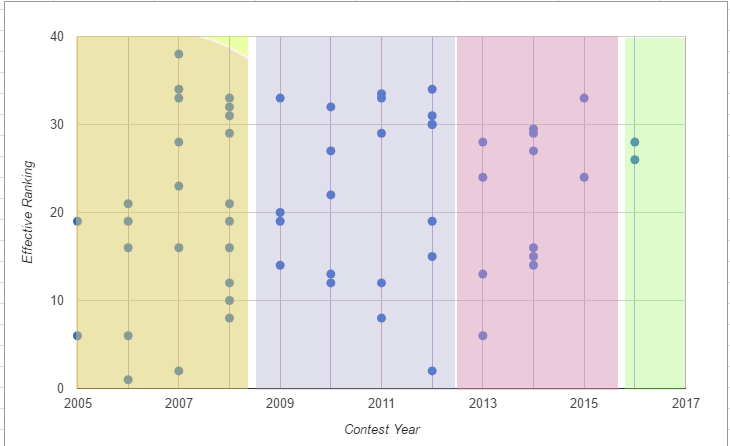One of the reasonably successful ways you can hold a space in the audience memory is by being the novelty act. Like many aspects of the Contest format, novelty acts go all the way back to the music hall and vaudeville traditions, and would showcase unusual physical talents, exotic themes and create a blend of music and comedy to appeal to a wide range of tastes. The novelty or speciality acts would be used to break up the program, and quite often proved to be the big draw to a particular show. The memorability and draw factor of novelty songs works in exactly the same way in the Contest as it did in the music hall.
What is a novelty song?
First of all, let’s define it. A novelty song is one that uses presentation, musical style or an individual talent to produce something unusual and different. They can range from the schmaltz of a children’s choir singing about a beloved elderly relative to the out and out weirdness of the Crazy Frog to the shoutalong anthem of Tubthumping by Chumbawumba. A lot of people wouldn’t consider Tubthumping to necessarily be a novelty song – the line between ‘unusual chart music’ and ‘novelty song’ is a wobbly and porous one. Here I propose a list of qualities that novelty records have, in an attempt to create a taxonomy of the types of novelty songs in the Contest and show which ones work and which ones don’t.
A novelty song will have one or more of the following:
- An unusual vocal quality or technique
- Be about something other than love and heartbreak
- A presentational gimmick
- Some form of musical innovation
Normally, a novelty song will have been developed intentionally to have one or more of these qualities – although it is possible to accidentally and perfectly seriously happen upon the novelty ingredients. It’s important that the artist fully buys into the whole novelty song package, because an audience can tell when an artist is uncomfortable singing about Facebook or performing dressed as a sexy devil.
Check Out My Skills
A novelty song can be constructed around the particular skill of a single artist. If your artist has a huge vocal range that culminates in a strong and theatrical falsetto, then you’re going to at some point do a run that goes all the way from the bottom to the top.
The two big vocal speciality acts this year are obviously Yodel It! And My Friend. Yodelling is hard, and you’ve got to have incredible vocal control to do it as consistently and freely as Ilinca does. I’m still not sure how Jacques Houbeck is planning on performing My Friend, but I’m sure it will allow him to show off his smooth pop vocal as well as his booming tenor.
Gotta Have A Gimmick
How much more Eurovision can we get than by talking about gimmicks? An eye-catching prop, a costume that takes incredible risks, a walking robot or a coat that turns out to be full of writhing naked people. A man in a hamster wheel, a flaming grand piano – in fact, you know what I mean.
A gimmick isn’t just the product of a stage designer having a fever dream. A good gimmick should act as the logo for your song, and provide a call to action during the voting recaps. If your song isn’t “The one with the…” when people are talking about their favourites then your gimmick has failed. At an early stage in the 2017 rehearsals, it looks like we’ve got “The one with the horse up a stepladder”, “The one with the neon rave graphics that triggered our Barry’s migraine”, “The one with the sparkly moon” and obviously “The one with the gorilla”
This Is Not A Love Song
Like all chart pop, most Eurovision songs are about love in some form or another. A novelty song is often about something entirely outside the realm of the usual: political satire, baking a cake, the pleasures of being a vampire or a pirate, whatever Wadde Hadde Dudde Da was about, the level of signal on God’s mobile phone.
This year in this category we’ve got Norway’s Grab the Moment, which is a sort of dancefloor memento mori, Ukraine’s Time, which is about the need for calmness in modern discourse, and of course Italy’s Occidentali’s Karma, which comments upon the shallowness of modern Western life and the subsequent adoption of Eastern thought systems. It’s all a bit more complex than Dschingis Khan.
Genre Smash
Rap and children’s choirs. Opera and metal. Ska and Greek bouzouki folk. Balkan turbopop and hair metal. Here at Eurovision we see many combinations that our artists were so busy wondering if they could that they never considered if they should. We’re very lucky this year to be seeing a couple of threeway fusions – the rap/yodel/R&B histrionics of Romania’s Yodel It! alongside the aurally confusing opera/R&B/guided meditation of My Friend from Croatia.
Genre smash songs work by giving the listening ear something very unusual that can quickly form a new memory. The down side of this is that it’s a risky gamble that can just as easily provoke disgust and rage as it can delight. My favourite genre smash from the past is probably the surprisingly fitting combination of Greek folk song and ska punk that Greece delighted us with in 2013.
Of course, you can also achieve a novelty effect at Eurovision by bringing a song that is from a non-typical genre. The stark juxtapositions of the true punk of Finland’s PKN in 2015 and the cool 1995 UK R&B of Love City Groove stood out because they were significantly different to the schlagerpop and ballads surrounding them. This isn’t always a good thing – one of the ESC Insight pet theories is that it is easier to compare like with like when you’re judging a competition – when there’s only one song of a very specialist genre, it is almost impossible to place it in a ranking with other things you’ve got more experience of listening to.
Shameless Flag Waving
This is a sort of Eurovision specialist novelty category – either the song is a straightforwardly patriotic anthem, or contains an appeal to a wider geographic category that is intended to curry favour with televoters as members of that group. Belarus and Moldova couldn’t really have been hoping to achieve much more than state their national pride with ‘I Love Belarus’ and ‘Hora Din Moldova’ but the wider the group you appeal to, the better you stand to do – ‘The Balkan Girls’ and ‘My Slowanie’ were both aimed at trans-national groups which also happen to have significant diasporas.
How Do Novelty Songs Perform?
Not incredibly well, to be totally honest. Since 2009 there have only been 3 novelty songs to break the Grand Final Top 10 – Party For Everybody, Alcohol is Free and Jedward’s seminal Lipstick. A novelty song notably won in 2006, but that’s it for the 21st Century. This makes it quite strange that many national broadcasters focus on the kitsch and novelty aspects of the contest, when it’s arguable that these are basically not relevant to the actual competition.
Examining the performance of novelty songs since 2005, I’ve tried to show you how the different voting eras of the contest affected the performance of novelty songs. The effective ranking is either the Grand Final placing (you can see Lordi and Verka at 1 and 2 in ’06 and ’07 respectively) or for songs which didn’t reach the semi-final, their semi-final placing plus the number of countries in the grand final, minus the number of qualifiers in each semi. Is that complicated enough?

The interesting thing about the graph is that the switch from 100% televote (the yellow part of the graph) to 50%/50% jury-televote (the blue section ) didn’t actually kill off novelty songs – what actually stopped novelty songs from performing well was the introduction of 1-26 jury ranking (in pink on the graph), which effectively allows juries to severely penalise songs that they consider to be unworthy of their time. Novelty songs are particularly vulnerable to this,because the industry professionals in the jury room see the gimmick instead of the song. What you need to do is to strap the novelty techniques to a well-written and professionally performed song, and then see what the juries have to say about that.
Could 2017 see the triumph of a new kind of novelty song? Could we be seeing the attention grabbing techniques of lowest-common-denominator throwaway pop being used to sell us sophisticated ideas about philosophy and yodelling? I guess we’ll have to wait for the Grand Final.










One fan’s novelty is another’s ‘pushing the envelope’ – I suppose that even “My Friend” is doing something daring, even though it will probably be total car crash. As for “Yodel It!”, I’m in the sector that hates it, as pure yodelling goes right through my head!
I don’t feel that our potential winner is that novel but it will be interesting to see if those watching see and hear what a lot of fans do or whether they see a smiling cheeky chappy and a man in a gorilla suit dancing to an Italian song. If it wins, “Occidentali’s Karma” will be judged a masterstroke – if it bombs, it will unfairly end up in the same clips as “Papa Pingouin”, the ultimate Eurovision novelty song…
I suspect Danbert Nobacon would chuck an ice bucket over you for putting Tubthumping and ‘novelty song’ in the same sentence though!
How is “Rise Like a Phoenix” not a novelty song?
ESC is (or should be at least) about music, about having the best song. At least the song with most appeal – more correctly said.
It’s not about glamour, visual or novelty.
But I agree that the visual impact have been too big after 2000. It kind of makes the contest less “serious”. OK – it’s the same with pop / rock in general, fair enough. But I think EBU needs to try to change the development. Reintroduce live music in stage – if wished for – would be a nice start I suppose.
I guess the term “novelty” is subjective, but I notice that the journalist use it in a lot wider sense than I do 🙂
For instance – Finland 2015, Latvia 2006 and UK 1995 novelty? OK – I am with you when it comes to the “musical innovattion” side. They do have it. Great quality songs, in an enriching, brave and renweing style for ESC. But I think they are far too goodto be called novelty…I doubt the singers themselves would call them novelty. And I think many punk rockers, acaepella fans and rapprs wouldn’t quite agree either 🙂
For me, novelty is a kind of “unserious” music. often based on big visual gimnicks. Like Iceland 2006, Austria 2003, Israel 1987, Ireland 2008, and Latvia 2008. I don’t like any of those. And for me the latter is one of the worst EVER songs in ESC!
I Don’t mean to “write off” an interesting article as such. I just would like to point of that I don’t agree, as far as “novelty” goes 🙂